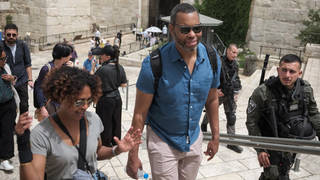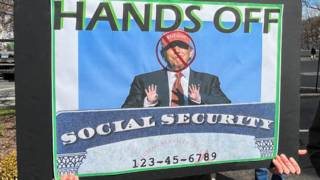
As foreign powers look to shape Syria’s political landscape after the toppling of the Assad regime, the country’s Kurdish population is in the spotlight. Turkish President Recep Tayyip Erdoğan continues to threaten the Syrian Kurdish YPG militia, which Turkey regards as an extension of the Kurdistan Workers’ Party militants who have fought an insurgency against the Turkish state for 40 years. Turkey’s foreign minister recently traveled to Damascus to meet with Syria’s new de facto ruler Ahmed al-Sharaa, the head of the Islamist group HTS. “Turkey is a major threat to Kurds and to democratic experiments that Kurds have been implementing in the region starting in 2014,” says Ozlem Goner, steering committee member of the Emergency Committee for Rojava, who details the persecution of Kurds, the targeting of journalists, and which powerful countries are looking to control the region. “Turkey, Israel and the U.S. collectively are trying to carve out this land, and Kurds are under threat.”
Transcript
AMY GOODMAN: This is Democracy Now!, democracynow.org, The War and Peace Report. I’m Amy Goodman.
We end today’s show with Syria and what the fall of the Assad regime means for Syria’s 2 million Kurdish people, who make up about 10% of the country. Since the Islamist armed group HTS toppled the Assad regime, Turkey, Israel and the United States are vying for greater control in post-Assad Syria, and the balance of power seems to be shifting against Kurdish groups.
Turkey’s foreign minister traveled to Damascus Sunday to meet with Syria’s new de facto leader Ahmed al-Sharaa, the head of HTS. According to press accounts, they discussed the need for Syria to draft a new constitution, Israel’s attacks on Syria, and the future of the Kurds.
Meanwhile, a U.S. delegation met with al-Sharaa on Friday, and the Biden administration is moving to lift a $10 million bounty on him over his links to al-Qaeda. The Pentagon has also acknowledged there are now about 2,000 U.S. troops in Syria, more than double the previously announced figure of 900.
On Monday, the Turkish President Tayyip Erdoğan said Syrian Kurdish armed groups had no place in Syria’s future, adding that Turkey would continue targeted operations against it. Turkey regards the Syrian Kurdish militia YPG as an extension of the Kurdistan Workers’ Party, or PKK, which has fought an insurgency against the Turkish state for 40 years. The Syrian Kurdish YPG is the military wing of the Syrian Democratic Forces, or SDF, a key U.S. ally in fighting the Islamic State. But the return of President-elect Trump has called into question how long Washington’s support will continue.
For more, we’re joined here in New York by Ozlem Goner. She is associate professor at the Department of Sociology and Anthropology at the College of Staten Island and the Department of Middle Eastern Studies at the Graduate Center of the City University of New York, CUNY. She’s also a steering committee member of the Emergency Committee for Rojava and is from the Bakur region of broader Kurdistan.
Welcome to Democracy Now!, Professor.
OZLEM GONER: Thank you.
AMY GOODMAN: Talk about your concerns right now. What exactly is happening to the Kurdish population of Syria?
OZLEM GONER: Thank you so much for having me.
So, this is a big threat for the Kurdish populations in Syria, and this is also a big threat for this democratic confederalist, women’s liberationary and pluralist experience that Kurds initiated in the region of north and east Syria more broadly, because Turkey, as you’ve shown in the clip, and also as President Erdoğan, for example, just this past week said that we can’t confine the great Turkish nation to its 700-something thousand kilometers. So, Turkey is very explicitly saying that they’re involved. Turkey has said very explicitly that they’ve been supporting HTS for 11 years and that they have a stake in Syria and have explicitly been intervening in the region, pushing for its interests, trying to further its already-occupied — for example, Turkey has been occupying Afrin region of north and east Syria, that was under the Kurdish self-government for now since 2018. So, Turkey is a big threat to the democracy and against Kurds especially at this moment.
And we’ve seen in Syria, you know, both Israel and Turkey are making their progress, trying to control further territory, trying to exert further power and control in the region, and all through the U.S. You know, U.S. has been — Turkey is a NATO country. We have to know this, because sometimes this is represented as if there’s, like, Turkey versus the U.S., whereas, actually, Turkey is one of the major allies of the United States in the region. Turkey is the second-largest NATO army. And Turkey has been not only massacring, torturing, imprisoning Kurds under the Turkish territories, under the Turkish nation-state, but has been killing journalists in Kurdistan, has been killing journalists in Syria, in Iraq. So Turkey is really playing at becoming a major force in this region and taking Kurds out of the picture here.
AMY GOODMAN: Let’s talk specifically about the journalists. Press freedom groups have condemned the killing of two Kurdish journalists, Nazim Dastan and Cihan Bilgin, by a Turkish drone as they were reporting on attacks on the Tishrin Dam on the outskirts of Kobani in northern Syria.
OZLEM GONER: Right, right, right.
AMY GOODMAN: Explain the significance of this area and who those journalists were.
OZLEM GONER: Right. So, those journalists — this is very, very important. This is crucial that Turkey targeted — target-killed these two journalist in north and east Syria.
AMY GOODMAN: A man and a woman.
OZLEM GONER: A man and a woman, yes. So, Nazim Dastan has been showing Turkey’s involvement with ISIS in 2014, when Kobani, this town that’s now under the threat of yet another Turkish invasion, and the SNA, the Turkish militias, Turkish mercenaries, paid by Turkey, are at the border and have started also a ground invasion. Turkey is using airstrikes and drones to also kill, do these targeted killings. Nazim Dastan was the journalist in 2014 who showed the Turkish-ISIS alliance and how, the ways, the different ways that Turkey was supporting ISIS in the region. And he was actually imprisoned in Turkey prior to his killing in north and east Syria.
And Cihan Bilgin has also been doing very important work, showing, for example, the lives of Kurdish people who were displaced from Afrin by Turkey’s ethnic cleansing in 2018. So, she has been in the region reporting the lives of these displaced people and also the ongoing Turkish attacks, because we need to understand something that’s very important, is that Turkey, from 2014, by supporting ISIS into the killing of 14,000 Kurdish people at the hands of ISIS, backed by Turkey, was very important.
Since then, in 2018, Turkey occupied Afrin, a region in north and east Syria that was under the Kurdish self-rule, and ethnically cleansed thousands of people, sold Kurdish women to slavery. And there are many, many human rights reports that show this at this moment. So, 2018. 2019, Turkey again came to the U.N. meeting and, in front of all the U.N., the world leaders, showed a detailed map as to how Turkey plans to colonize and occupy the north and east Syria. So, it’s trying to attack Kurds in 2023 right before Israel’s genocide started in Gaza. Turkey destroyed 40 to 50% of infrastructure in north and east Syria. And these, you know, they hardly make it to the media, but these are the realities that Turkey is a major threat to Kurds and to democratic experiment that Kurds have been implementing in the region starting in 2014.
AMY GOODMAN: So, let’s talk about how this will all play out with the presidential transition here.
OZLEM GONER: Right.
AMY GOODMAN: The U.S. is backing one Syrian Kurdish group that Turkey is opposed to, but at the same time, Turkey and the U.S. are allies, right?
OZLEM GONER: Yes, yes.
AMY GOODMAN: Both in NATO.
OZLEM GONER: Yes.
AMY GOODMAN: And also, how worried are Kurds in Syria about President Trump returning to power? In 2019, he greenlit a Turkish invasion into northern Syria.
OZLEM GONER: Right, right. I mean, as you know, these are fascist governors, governments, that are basically in coordination since the Cold War. Turkey has been one of major allies of the United States in the region, starting with the Cold War, I mean, using military training, sales of war equipment. The planes, the F-16s, that kill Kurds in north and east Syria are sold by the U.S., and not only are sold by the U.S., but the U.S. actually gives a lot of military funding, humanitarian funding, that are used in the purchase of these, this weaponry.
So, behind, you know, if you scratch the surface a little bit, the only purpose of those U.S. troops in the region were to prevent the further growth of ISIS, because even prior to the U.S. entering the region, it was the Kurdish forces who have been, because of their own movement’s success of 40 years of practicing of self-governing, self-defense, women’s self-defense forces — so, these were all in place before the U.S. entered the region. But the current presence of the U.S. troops is to prevent Turkey from entering, annihilating, crushing, killing Kurds in tens of thousands. What we’re seeing in Gaza today can happen in Rojava if we don’t enter. And it happened previously to Kurdish populations in my hometown of Dêrsim, 1930s, in Iraq. So, the Kurdish populations at the hands of these governments, who are in cooperation with the U.S., who use U.S. funding, U.S. military equipment, and then somehow appearing on the surface as if there is some contradiction here between the U.S. and Turkey. At the moment, as you said in the beginning, Turkey, Israel and the U.S. collectively are trying to carve out this land, and Kurds are under threat.
And also, I have to say one important thing is, even during Assad regime, Turkey was preventing the Kurds from sitting at the negotiating table to determine the future of a democratic Syria. And Turkey is doing that right now, while HTS have been giving some messages that Kurds could be included in this process. That is, after that, the Turkish foreign minister made several visits, signaled that, “Hey, we have been supporting HTS for the last 11 years.” And so, Turkey is trying very hard to prevent Kurds from sitting at the negotiating table. And that’s a very big loss for the region in general.
AMY GOODMAN: And, of course, we’ll continue to cover this. Ozlem Goner, we want to thank you so much for being with us, associate professor at the Department of Sociology and Anthropology at the College of Staten Island and also at the CUNY Graduate Center here in Manhattan.
Happy birthday to Narmeen Maria! Tune in tomorrow to our tribute to the blacklisted lyricist Yip Harburg, the man who put the rainbow in The Wizard of Oz, his songs sung by millions around the world. This is Democracy Now! I’m Amy Goodman. Thanks for joining us.












Media Options